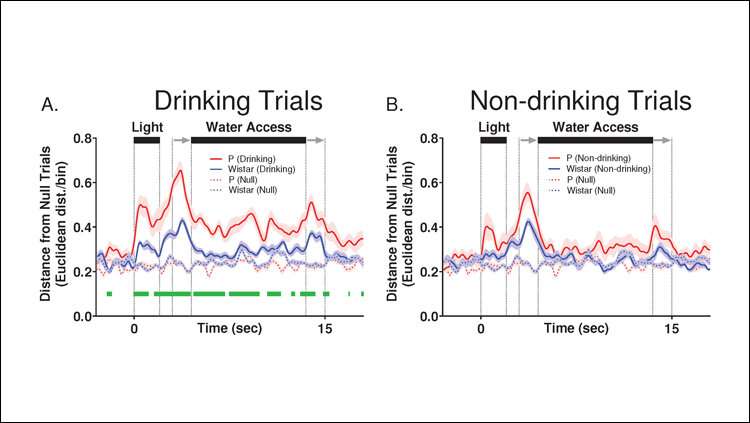Prefrontal cortex activity more robustly encodes alcohol-associated stimuli in rats with a family history of excessive drinking, even when water is presented in place of alcohol. Credit: Linsenbardt et al., eNeuro 2019
Neural activity that reflects the intention to drink alcohol is observed in the prefrontal cortex and is blunted in rats with a family history of excessive drinking, according to research from eNeuro. This insight could lead to novel treatments for alcohol use disorders.
The prefrontal cortex is a brain region involved in decision-making that becomes active before a behavior is initiated, indicating intention. David Linsenbardt, Nicholas Timme, and Christopher Lapish at Indiana University ? Purdue University Indianapolis investigated neural activity in the prefrontal cortex to determine if it encodes the intention to consume alcohol.
Linsenbardt's team compared activity before and during alcohol consumption in two types of rats. One modeled a family history of alcohol abuse, while the other lacked this family history. The prefrontal cortex was active during consumption in both types of rats, but only active pre-consumption in the rats without a family history of drinking.
These findings suggest that the prefrontal cortex directly encodes the intention to consume alcohol but less so in those with greater risk of abusing alcohol. Restoring prefrontal cortex activity in individuals with a predisposition to over-drink could be a new approach for treating alcohol use disorders.
More information: Encoding of the Intent to Drink Alcohol by the Prefrontal Cortex is Blunted in Rats with a Family History of Excessive Drinking, eNeuro (2019). DOI: 10.1523/ENEURO.0489-18.2019
Provided by Society for Neuroscience
























